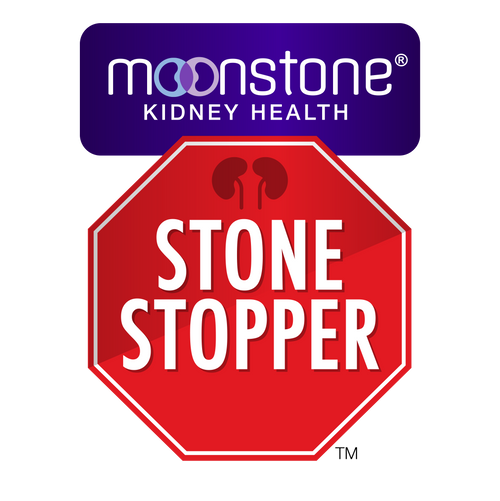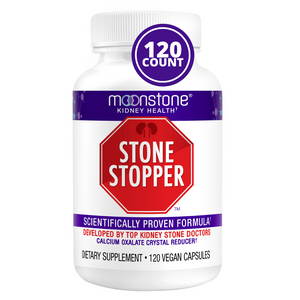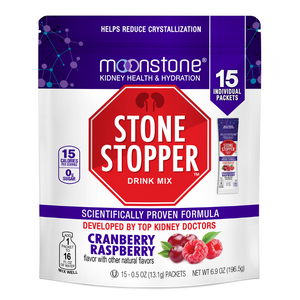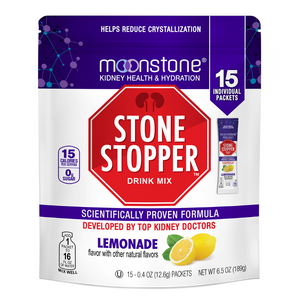The relationship between Weightlifting and kidney stones is a complicated one. Everyone wants to live a long, healthy life, and for many that includes going to the gym. While this promotes wellness, studies highlight exercise intensity correlating with kidney stone and disease risk. This is especially true when it comes to proper hydration before, during and after a workout. Furthermore, if a workout is too intense the muscles become damaged which causes myoglobin to be released into the bloodstream. This protein is difficult to pass through our body's filtration system, especially the kidneys! Have you ever wondered, can heavy lifting cause kidney stones to move?
What can we do about it? Read on to learn more.

WORKOUTS AND THE INCREASED RISK FACTORS OF KIDNEY STONES
Although moderate-intensity exercises are safe in most cases, strenuous and high-intensity exercises may lead to serious health issues. Can heavy lifting cause kidney stones to move? Can working out increase the risk of a kidney stones? Serious injuries can include rhabdomyolysis and acute kidney injury (AKI).
- Spinning / Cycling – Numerous studies have shown those who take part in spin classes can have extremely high levels of creatine kinase (CK) in their blood. This causes the kidneys to work overtime and leads otherwise healthy individuals at any age to being hospitalized.
- High Intensity Training – High intensity interval resistance training (HIIRT) in particular can cause muscle damage and raise biomarkers of acute kidney injury. It involves a burst of intense, heavy resistance exercises followed by a period of rest. Just a single HIIRT session is enough to cause significant elevations in CK, myoglobin, and other biomarkers. These markers are indicative of kidney injury.
- Weightlifting – Lifting weights that are too heavy can cause muscle and joint damage. It can also cause spinal injuries (e.g.: herniated discs), tear a heart artery, or overload your blood stream with proteins that lead to kidney failure. The latter two in particular can lead to hospitalization and, in extreme cases, result in death.
OTHER FACTORS THAT CONTRIBUTE TO KIDNEY STONE RISK + CAUSING KIDNEY STONES TO MOVE
Can heavy lifting cause kidney stones to move? Workouts can be a huge driver in overtaxing the body if done incorrectly. However, there are a variety of other factors that have a direct correlation to increased kidney stone risk. Factors with a direct correlation that also contribute a rise in kidney stone risk include:
- Certain Diets – Diets high in protein (especially animal protein: meat, poultry, eggs, and seafoods). These boost the level of uric acid which leads to kidney stones. At the same time, they reduce levels of urinary citrate which prevents stones from forming. Other common food consumed by health-conscious individuals that contain oxalates (that lead to kidney stones) include spinach, rhubarb, almonds & cashews, beets, okra, raspberries, sweet potatoes, and even stevia sweeteners.
- Dehydration – Not drinking enough water increases your risk of kidney stones and exertional rhabdomyolysis.
- Rhabdomyolysis happens when you push too hard in the gym (to the point of muscle exhaustion and damage). Also when you don’t stay hydrated and/or work out during high temperatures. While men are more prone, there has been an increase in women being impacted as well. It’s also important to note fitness level does not impact your chances – it’s about exertion level.
- Symptoms include intense muscle pain, spasms, weakness, stiffening, swelling, and dark urine. If you begin to experience any of these symptoms, head to the ER immediately! Many recover through intravenous fluids & blood test monitoring at the hospital. However, it is worth noting that acute kidney injury (AKI) is also seen in up to 58% of patients with rhabdomyolysis.
- Supplements & Medications – Dietary supplements and pain medications can also increase your risk, but specific gym-related supplements can as well. Always ask your doctor about supplementation and contraindications before adding anything new to your daily routine.
DANGERS OF WEIGHTLIFTING SUPPLEMENTS
When you begin training and working out, most people consume high amounts of protein. They also add supplements to combat muscle fatigue & lactic acid buildup, and more. By consuming excessive amounts of nutritional supplements as well as abuse of anabolic steroids, there is a high risk for acute and potentially chronic kidney injury.
- Protein Shakes – As previously discussed, high-protein diets (including protein powders & shakes) can lead to overexertion of the kidneys and an increase in kidney stone potential.
- High Creatine & Vitamin Intake – While the old adage “everything in moderation” can be true, a high intake of creatine supplements and other vitamins like A, D and E can carry increased risks as well.
- Anabolic steroids – The dangers and harm to health that anabolic steroids can cause should be a no-brainer. However, many athletes still use them to gain muscle mass and strength. While these drugs are known to impair endocrine and liver functions, it also leads to protein leaking into the urine leading to severe reductions in kidney function. This kidney damage has shown to be more severe than in highly obese patients.
WHAT TO DO & HOW TO PREVENT
When working out, you can help prevent kidney stones & injury by:
- Working up to higher weights & more intense workouts
- Warm up and cool down
- Use spotters when you do major lifts
- Use proper lifting techniques
- Wear proper shoes and weightlifting belts & gloves
- Don’t exercise any set of muscles more than 3 times a week
Also, make sure your diet includes foods that are high in potassium and magnesium to help prevent kidney stones. Increase your intake of whole grains and cruciferous vegetables (such potassium-rich foods as brussels sprouts, broccoli, and kale decrease calcium loss) as well.
ADDING MOONSTONE STONE STOPPER
In addition to gradually increasing weights, and maintaining good hydration, those engaging in regular weightlifting might consider including a doctor-recommended kidney stone supplement in their routines.
Moonstone Stone Stopper™ is a gentle alternative to traditional kidney stone treatment. It is the first OTC supplement designed to address kidney stone crystallization. Moonstone Stone Stopper is a natural supplement that contains alkali citrate, an important ingredient that has been shown to help prevent the formation of kidney stones. Alkali citrate works by increasing the pH of the urine, making it less acidic and reducing the likelihood of stone formation. This can be especially beneficial for weight lifters, who may be more prone to developing kidney stones due to the high protein content of their diets.
In addition to its active ingredients, Moonstone powder beverages have no added sugar, are low in sodium, and are an excellent source of magnesium and vitamin B6. Moonstone may also appeal to people seeking clean label products because it is also non-GMO, and free of wheat, fat, and soy.
Available in capsules and ready-to-mix powder beverages in a variety of delicious flavors, add it to your water before, during, and/or after workouts. The beverages come in Lemonade, Wild Berry, Cranberry Raspberry and Tropical flavors. With free shipping, now is the best time to try Moonstone Stone Stopper™ for yourself.
Adding kidney stone prevention to your weightlifting and workout routine has never been easier. Just mix the powder with 16 ounces of carbonated or non-carbonated water, stir well, and enjoy on the go!







1 comment
recent surgery to remove stones which we smallish . am learning more about what to eat vs what to avoid. This is all excellent info. which did not get from MD